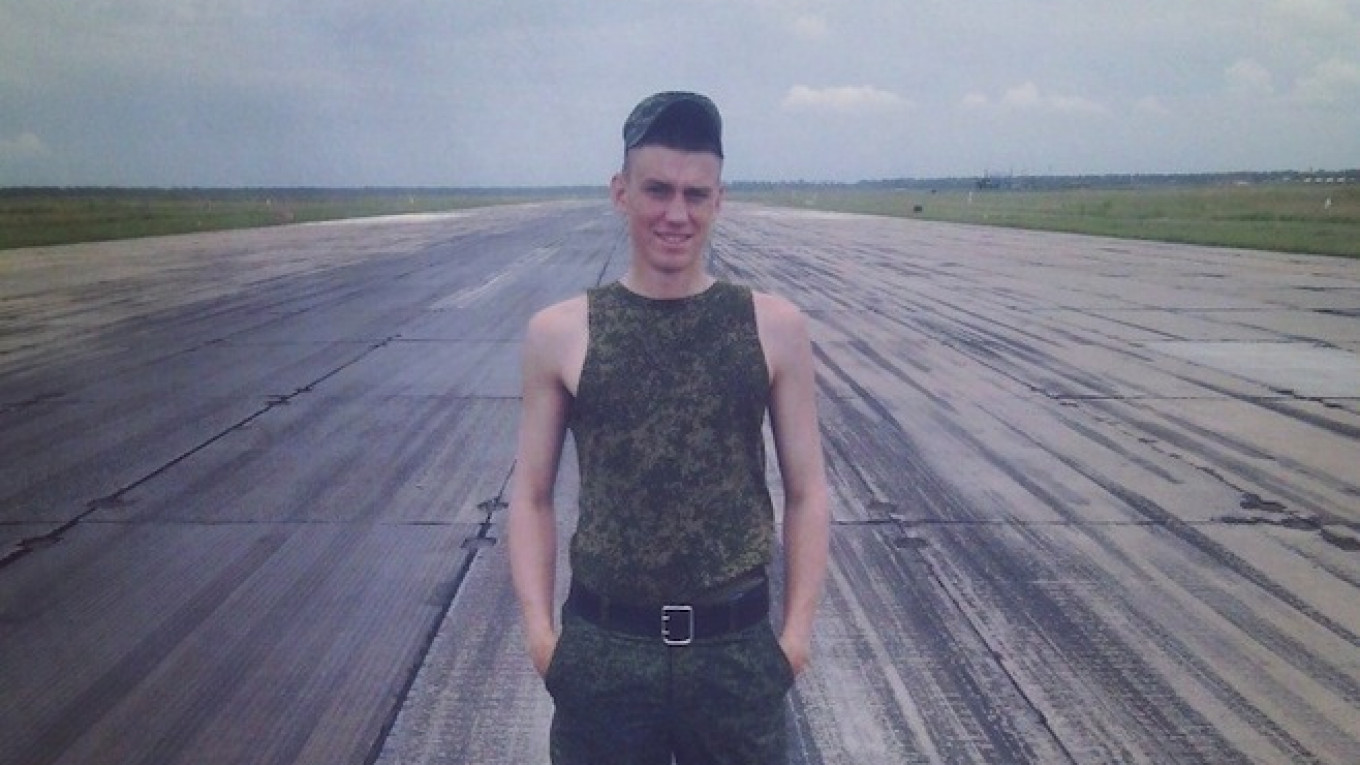Russia's Defense Ministry said Tuesday that a 19-year-old soldier had died in Syria, Russia's first confirmed casualty in the conflict, but said he had killed himself.
The death on Saturday of Vadim Kostenko, a contract soldier and air force technician, was the first bad news to face Russians since a deployment of about 2,000 personnel and 50 aircraft began bombing the Islamic State and other rebel groups in Syria on Sept. 30.
The news of his death was broken by Conflict Intelligence Team, an activist group founded by blogger Ruslan Leviyev. The group posted messages on social media and photos depicting a skinny teenager with a shaved head and toothy smile, and called for further investigation into his death.
They also cited a post on social media about nine other Russian military casualties in Syria, which they had not been able to confirm, and an unverified tweet from Syria about smoke billowing from Russia's airbase on Oct. 23, the day before Kostenko reportedly died.
In a statement to the TASS news agency, the Defense Ministry confirmed that Kostenko had died at Hmeimim airbase in Latakia, Syria, but said he had killed himself while off duty after falling out with his girlfriend.
Interviewed by Reuters, Kostenko's parents said they didn't believe that their son had hanged himself, and that their son had sounded happy during a phone call on Saturday.
The ministry did not respond to a request for comment. Military analysts said Tuesday that the death of a soldier on deployment was a normal occurrence, and political pundits insisted that casualties would not slow Russia's military juggernaut. If anything, they said, it would provoke the opposite.
So effective has the media coverage been in glorifying Russian air strikes that if Kostenko had been killed in combat, he could easily have become “the first hero of Syria,” said Alexei Malashenko, a scholar-in-residence at the Carnegie Moscow Center.
Jingoistic coverage of the intervention by state media has rallied Russians behind the campaign and raised President Vladimir Putin's approval rating to new highs of almost 90 percent.
But so far the attacks have had no human cost for Russia. Reports of dead Russian soldiers both in Syria and in eastern Ukraine, where Moscow is suspected of having deployed soldiers last year, have always been repudiated and denied airtime.
Malashenko said the activists' attempts to investigate would have little impact on public opinion. The masses are transfixed by Russia's revival on the global stage, he said, and their response to naysayers will be: “They don't understand that Russia is a great power, and cannot avoid sacrifices to protect itself and the world.”
The conflicts in Syria and Ukraine have been framed in the mainstream Russian media as good versus evil, with Putin battling a malevolent America and brutal terrorists. Military action also chimes perfectly with the Russian psyche, which is ready for sacrifices, said Dmitry Oreshkin, a political analyst.
“For Russians, to rise from your knees means to crack someone in the face,” he said, and the loss of a few soldiers as a result is worth it.
Conflict Intelligence Team collected evidence from social media pages that showed a lack of outrage over the death of Kostenko, who signed up as a contract solder in June after finishing his compulsory service and was sent to Syria in September, according to the group. Kostenko served as a technician with the 906th close air support regiment, based near his home in the Krasnodar region in southern Russia, the group said.
Messages by Kostenko's friends on VKontakte, the Russian version of Facebook, read: “He died fulfilling his military duty,” “Brother, we'll never forget you,” and “We remember. We love. We grieve.”
The six o'clock news on state-owned Channel One ignored the incident. Leading the bulletin was news that American boxer Roy Jones Jr. had received a Russian passport.
Oreshkin called the ministry's version of Kostenko's death as suicide a “neutral option.”
Even the worst-case scenarios in Syria, such as the downing of helicopters or recorded beheading of Russian servicemen by the Islamic State, would hardly shake public support, said Malashenko. It would only reinforce the propaganda of “battling barbarians.”
Putin has repeatedly shown that he will not reverse policies over the human cost.
Terrorists from Russia's North Caucasus staged massive attacks against Russian civilians several times during Putin’s first decade in power, demanding that Moscow withdraw troops from Chechnya, but each time to no avail.
The only thing that could force the Kremlin to think again about using force would be mounting losses of aircraft and troops and “a long, constant sense of failure,” according to Oreshkin.
Contact the author at [email protected]
A Message from The Moscow Times:
Dear readers,
We are facing unprecedented challenges. Russia's Prosecutor General's Office has designated The Moscow Times as an "undesirable" organization, criminalizing our work and putting our staff at risk of prosecution. This follows our earlier unjust labeling as a "foreign agent."
These actions are direct attempts to silence independent journalism in Russia. The authorities claim our work "discredits the decisions of the Russian leadership." We see things differently: we strive to provide accurate, unbiased reporting on Russia.
We, the journalists of The Moscow Times, refuse to be silenced. But to continue our work, we need your help.
Your support, no matter how small, makes a world of difference. If you can, please support us monthly starting from just $2. It's quick to set up, and every contribution makes a significant impact.
By supporting The Moscow Times, you're defending open, independent journalism in the face of repression. Thank you for standing with us.
Remind me later.






